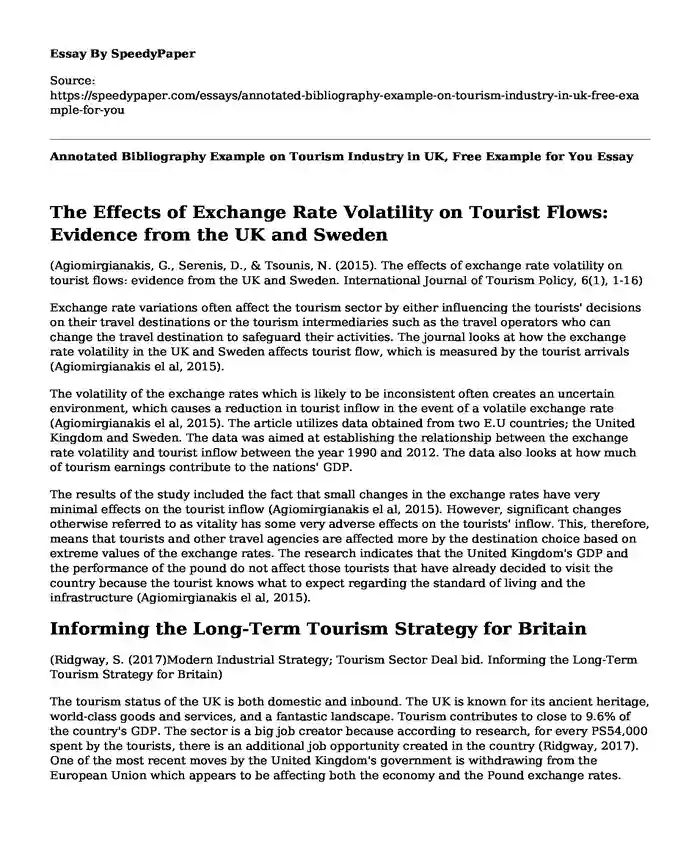The Effects of Exchange Rate Volatility on Tourist Flows: Evidence from the UK and Sweden
(Agiomirgianakis, G., Serenis, D., & Tsounis, N. (2015). The effects of exchange rate volatility on tourist flows: evidence from the UK and Sweden. International Journal of Tourism Policy, 6(1), 1-16)
Exchange rate variations often affect the tourism sector by either influencing the tourists' decisions on their travel destinations or the tourism intermediaries such as the travel operators who can change the travel destination to safeguard their activities. The journal looks at how the exchange rate volatility in the UK and Sweden affects tourist flow, which is measured by the tourist arrivals (Agiomirgianakis el al, 2015).
The volatility of the exchange rates which is likely to be inconsistent often creates an uncertain environment, which causes a reduction in tourist inflow in the event of a volatile exchange rate (Agiomirgianakis el al, 2015). The article utilizes data obtained from two E.U countries; the United Kingdom and Sweden. The data was aimed at establishing the relationship between the exchange rate volatility and tourist inflow between the year 1990 and 2012. The data also looks at how much of tourism earnings contribute to the nations' GDP.
The results of the study included the fact that small changes in the exchange rates have very minimal effects on the tourist inflow (Agiomirgianakis el al, 2015). However, significant changes otherwise referred to as vitality has some very adverse effects on the tourists' inflow. This, therefore, means that tourists and other travel agencies are affected more by the destination choice based on extreme values of the exchange rates. The research indicates that the United Kingdom's GDP and the performance of the pound do not affect those tourists that have already decided to visit the country because the tourist knows what to expect regarding the standard of living and the infrastructure (Agiomirgianakis el al, 2015).
Informing the Long-Term Tourism Strategy for Britain
(Ridgway, S. (2017)Modern Industrial Strategy; Tourism Sector Deal bid. Informing the Long-Term Tourism Strategy for Britain)
The tourism status of the UK is both domestic and inbound. The UK is known for its ancient heritage, world-class goods and services, and a fantastic landscape. Tourism contributes to close to 9.6% of the country's GDP. The sector is a big job creator because according to research, for every PS54,000 spent by the tourists, there is an additional job opportunity created in the country (Ridgway, 2017). One of the most recent moves by the United Kingdom's government is withdrawing from the European Union which appears to be affecting both the economy and the Pound exchange rates.
Over the last couple of years, the average spending and visits to the United Kingdom have increased, but inflation has led to a decline in the expenditure by visitors (Ridgway, 2017). The value of the Pound has fallen over time, especially after the referendum. This has improved the number of tourists visiting the country. The depreciation of the pound in the last couple of years has helped the UK become more competitive in Europe. More and more tourists have started streaming into the country since the Brexit. It appears that the country has become a relatively cheaper destination.
However, after the Brexit, there might be an issue surrounding employment rates as a result of the exchange rates (Ridgway, 2017). Therefore, there are two sides to the following problem, and something needs to be done to ensure a balance. The article suggests a close partnership between the public and private sectors to provide the stability of the pound and the general economy. It appears the decision to withdraw from the European Union is like to positively the tourism industry, but if not checked, the country's economy might be negatively affected.
References
Agiomirgianakis, G., Serenis, D., & Tsounis, N. (2015). The effects of exchange rate volatility on tourist flows: evidence from the UK and Sweden. International Journal of Tourism Policy, 6(1), 1-16.
Ridgway, S. (2017)Modern Industrial Strategy; Tourism Sector Deal bid. Informing the Long-Term Tourism Strategy for Britain
Cite this page
Annotated Bibliography Example on Tourism Industry in UK, Free Example for You. (2022, Jun 08). Retrieved from https://speedypaper.com/essays/annotated-bibliography-example-on-tourism-industry-in-uk-free-example-for-you
Request Removal
If you are the original author of this essay and no longer wish to have it published on the SpeedyPaper website, please click below to request its removal:
- Free Essay with Chemistry Problem Solving
- Organic Foods Stores Essay Sample
- Essay Sample about Course Work Writing
- Free Essay with the Journal Entry Reflection: The Importance of Having Good Communication
- Guidelines for Field Triage of Injured Patients - Free Essay in Medicine
- Essay Example: Employee vs. Independent Contractor
- Essay Example on Teaching Contents and Test Design in TESOL
Popular categories





